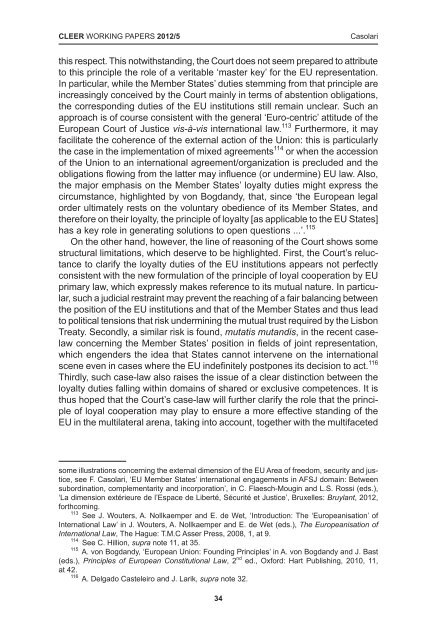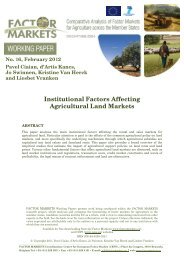Principles and practices of EU external representation - Asser Institute
Principles and practices of EU external representation - Asser Institute
Principles and practices of EU external representation - Asser Institute
Create successful ePaper yourself
Turn your PDF publications into a flip-book with our unique Google optimized e-Paper software.
CLEER WORKING PAPERS 2012/5Casolarithis respect. This notwithst<strong>and</strong>ing, the Court does not seem prepared to attributeto this principle the role <strong>of</strong> a veritable ‘master key’ for the <strong>EU</strong> <strong>representation</strong>.In particular, while the Member States’ duties stemming from that principle areincreasingly conceived by the Court mainly in terms <strong>of</strong> abstention obligations,the corresponding duties <strong>of</strong> the <strong>EU</strong> institutions still remain unclear. Such anapproach is <strong>of</strong> course consistent with the general ‘Euro-centric’ attitude <strong>of</strong> theEuropean Court <strong>of</strong> Justice vis-à-vis international law. 113 Furthermore, it mayfacilitate the coherence <strong>of</strong> the <strong>external</strong> action <strong>of</strong> the Union: this is particularlythe case in the implementation <strong>of</strong> mixed agreements 114 or when the accession<strong>of</strong> the Union to an international agreement/organization is precluded <strong>and</strong> theobligations flowing from the latter may influence (or undermine) <strong>EU</strong> law. Also,the major emphasis on the Member States’ loyalty duties might express thecircumstance, highlighted by von Bogd<strong>and</strong>y, that, since ‘the European legalorder ultimately rests on the voluntary obedience <strong>of</strong> its Member States, <strong>and</strong>therefore on their loyalty, the principle <strong>of</strong> loyalty [as applicable to the <strong>EU</strong> States]has a key role in generating solutions to open questions ...’. 115On the other h<strong>and</strong>, however, the line <strong>of</strong> reasoning <strong>of</strong> the Court shows somestructural limitations, which deserve to be highlighted. First, the Court’s reluctanceto clarify the loyalty duties <strong>of</strong> the <strong>EU</strong> institutions appears not perfectlyconsistent with the new formulation <strong>of</strong> the principle <strong>of</strong> loyal cooperation by <strong>EU</strong>primary law, which expressly makes reference to its mutual nature. In particular,such a judicial restraint may prevent the reaching <strong>of</strong> a fair balancing betweenthe position <strong>of</strong> the <strong>EU</strong> institutions <strong>and</strong> that <strong>of</strong> the Member States <strong>and</strong> thus leadto political tensions that risk undermining the mutual trust required by the LisbonTreaty. Secondly, a similar risk is found, mutatis mut<strong>and</strong>is, in the recent caselawconcerning the Member States’ position in fields <strong>of</strong> joint <strong>representation</strong>,which engenders the idea that States cannot intervene on the internationalscene even in cases where the <strong>EU</strong> indefinitely postpones its decision to act. 116Thirdly, such case-law also raises the issue <strong>of</strong> a clear distinction between theloyalty duties falling within domains <strong>of</strong> shared or exclusive competences. It isthus hoped that the Court’s case-law will further clarify the role that the principle<strong>of</strong> loyal cooperation may play to ensure a more effective st<strong>and</strong>ing <strong>of</strong> the<strong>EU</strong> in the multilateral arena, taking into account, together with the multifacetedsome illustrations concerning the <strong>external</strong> dimension <strong>of</strong> the <strong>EU</strong> Area <strong>of</strong> freedom, security <strong>and</strong> justice,see F. Casolari, ‘<strong>EU</strong> Member States’ international engagements in AFSJ domain: Betweensubordination, complementarity <strong>and</strong> incorporation’, in C. Flaesch-Mougin <strong>and</strong> L.S. Rossi (eds.),‘La dimension extérieure de l’Espace de Liberté, Sécurité et Justice’, Bruxelles: Bruylant, 2012,forthcoming.113 See J. Wouters, A. Nollkaemper <strong>and</strong> E. de Wet, ‘Introduction: The ‘Europeanisation’ <strong>of</strong>International Law’ in J. Wouters, A. Nollkaemper <strong>and</strong> E. de Wet (eds.), The Europeanisation <strong>of</strong>International Law, The Hague: T.M.C <strong>Asser</strong> Press, 2008, 1, at 9.114 See C. Hillion, supra note 11, at 35.115 A. von Bogd<strong>and</strong>y, ‘European Union: Founding <strong>Principles</strong>’ in A. von Bogd<strong>and</strong>y <strong>and</strong> J. Bast(eds.), <strong>Principles</strong> <strong>of</strong> European Constitutional Law, 2 nd ed., Oxford: Hart Publishing, 2010, 11,at 42.116 A. Delgado Casteleiro <strong>and</strong> J. Larik, supra note 32.34








